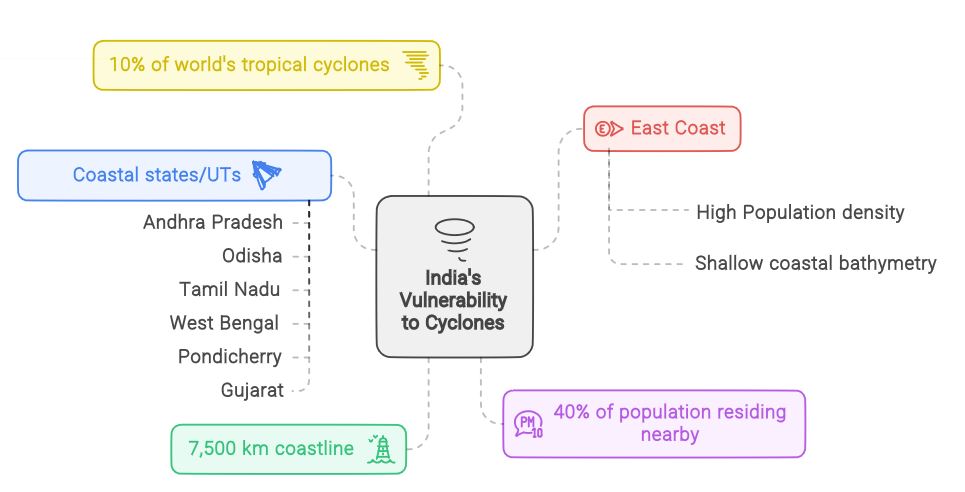Note4Students
From UPSC perspective, the following things are important :
Prelims level: Tropical Cyclone
Mains level: NA
Why in the News?
- Cyclone Remal is forecasted to make landfall between Sagar Island in West Bengal and Bangladesh’s Khepupara on Sunday midnight.
- The name ‘Remal’ originates from Oman and means ‘sand’ in Arabic.
What are Cyclones?
- Cyclones are wind systems rotating inwardly towards an area of low atmospheric pressure. They are categorised into Tropical (Temperature-induced) and Temperate (extra-tropical) cyclones(airmass-induced).
- Formation Conditions: Tropical cyclones originate in warm regions, requiring conditions such as
- Warm sea surface (> 27°C),
- Coriolis Force,
- Pre-existing low-pressure systems,
- Small vertical wind speed differences, and
- Upper air divergence.
Characteristics of Tropical Cyclones:
- They form over warm water bodies due to energy derived from the condensation of warm water within cumulonimbus clouds.
- Wind rotation is influenced by the Coriolis force, resulting in anti-clockwise rotation in the northern hemisphere and clockwise in the southern hemisphere.
Regional Movement of Cyclones:
- In the northern hemisphere, cyclones initially move westward under earth rotation and the Easterlies.
- As they progress towards higher latitudes, the Coriolis force deflects them rightward, towards north and later east.
- By 30° latitude, the diminished warmth halts cyclone activity.
Naming of Cyclones:
|

Destruction Caused by Cyclones:
- Strong Winds/Squall: Cyclones cause infrastructure damage through high-speed winds.
- Torrential Rains and Inland Flooding: Heavy rainfall leads to floods, soil erosion, and embankment weakening.
- Storm Surge: Abnormal sea level rise inundates coastal regions, causing floods, erosion, and destruction.
PYQ:[2015] In the South Atlantic and South Eastern Pacific regions in tropical latitudes, cyclone does not originate. What is the main reason behind this? (a) Sea Surface temperature are low (b) Inter Tropical Convergence Zone seldom occurs (c) Coriolis force is too weak (d) Absence of land in those regions |
Get an IAS/IPS ranker as your 1: 1 personal mentor for UPSC 2024
